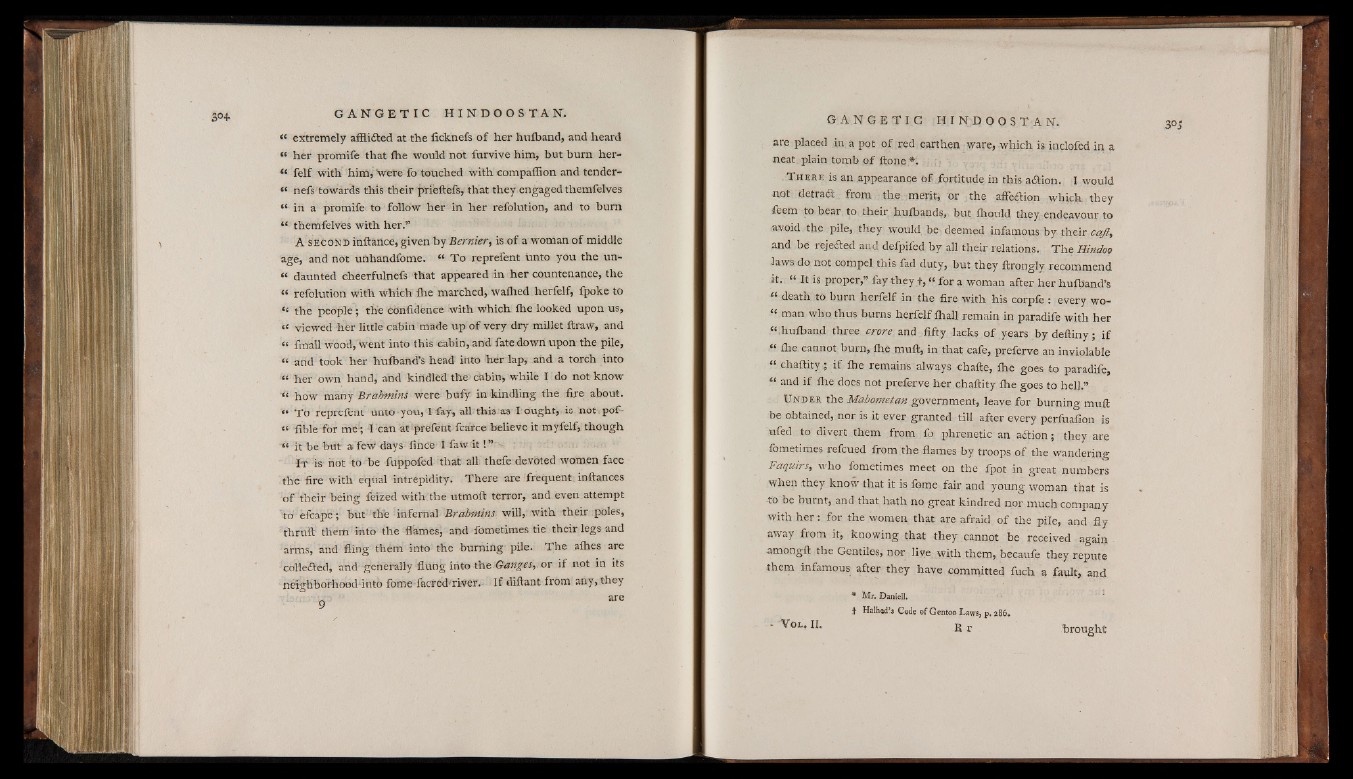
“ extremely affiiCted at the ficknefs o f her huiband, and heard
« her promife that ihe would not furvive him, but burn her-
“ felf with him, Were fo touched with compailion and tender-
“ nefs towards this their prieftefs, that they engaged themfelves
“ in. a promife to follow her in her refolution, and to burn
“ themfelves with her.”
A s e c o n d inftaiice, given by Bernier, is o f a woman o f middle
age, and not unhandfome. “ To reprefent unto you the un*
“ daunted cheerfulnefs that appeared in her countenance, the
“ refolution with which ihe marched, waihed herfelf, fpoke to
“ the people; the confidence with which ihe looked upon us,
“ viewed her little cabin made up of very dry millet ftraw, and
“ fiuall wood, went into this cabin, and fate down upon the pile,
“ arid took her huiband’s head into her lap, and a torch into
“ her own hand, and kindled the cabin, while I do not know
how many Brahmins were bufy in kindling the fire about.
« To reprefent unto-you, I fay, all this a s I ought, is notpofi-
« fible for me-f; le an at •prefent fcafce believe it myfelf, though
“ it be but a few days firice I faw it
I t is riot to be fuppofcd that all thefe devoted women face
the fire with equal intrepidity. There are frequent inftances
of'their being feized with the utmoft terror, and even attempt
to efcape; but the infernal Brahmins will, with their poles,
thruft them -into the flames, and fometimes tie their legs and
arms, and fling them into the burning pile. The alhes are
coHefted, and--generally -fliirig into the Ganges,, or i f not in its
neighborhoodfintb fome fecred'river. If diftant from any, they
h ta A p I are
are placed in a pot o f red earthen ware, which is inclofed in a
neat plain tomb of ftone
T here is an appearance o f fortitude in this aition. I would
not detradt. from the merit, or ;the affeCtion which they
feem to bear to. their hufbands,. but ihould they endeavour to
avoid the pile, they would be deemed infamous by their cajl,
and be rejected and defpifed by all their relations. The Hindoo
laws do not compel this fad duty, but they itrongly recommend
it. “ It is proper,” fay they+, “ for a woman after her huiband’s
“ death to burn herfelf in the fire with his corpfe : every wo-
“ man who thus burns herfelf ihall remain in paradife with her
“ huiband three crore and fifty lacks o f years by deftiny; i f
16 ihe, cannot burn, ihe muit, in that cafe, preferve an inyiolable
chaf t i tyi f ihe remains always chaite, ihe goes to paradife,
“ and if ihe does not preferve her chaftity ihe goes to hell.”
Under the Mahometan government, leave for burning muft
be obtained, nor is it ever granted till after every perfuafion is
ufed to divert them from fo phrenetic an aCtion; they are
fometimes refcued from the flames by troops o f the wandering
Faquirs, who fometimes meet on the fpot in great numbers
when they know that it is fome fair and young woman that is
to be burnt, and that hath no great kindred nor much company
with h e r : for the women that are afraid o f the pile, and fly
away from it, knowing that they cannot be received again
amongft the Gentiles, nor live with them, becaufe they repute
them infamous after they have committed fuch a fault, and
* Mr. Daniell.
t Halhad’s Code of Gentoo Laws, p, 286.
V ol, IL R r brought